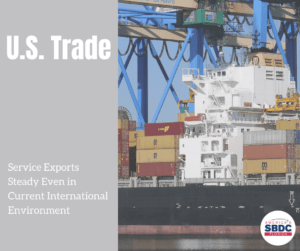Service Exports Not Slowing Despite U.S. Trade Issues

There’s been a lot of mention in the news these days of international trade, primarily trade wars, imposing tariffs and a trade deficit, which doesn’t sound good by any means. At times, it can even sound scary. These talking points are mostly referring to importing and exporting of goods, which are tangible products. Rarely do we hear about trade in services, which are intangible, and have been increasing on an annual basis. Actually, there’s been a trade surplus since 1971.
According to statistics provided by the International Trade Administration (ITA) and the U.S. Census Bureau, service exports in 2015 experienced an increase of $5.9 billion from 2014, the sixth year in a row for record-high services exports.
In 2016, service exports were $750 billion, a slight decrease from 2015 but individual service sectors, such as, other business, travel, information and insurance services all experienced record highs.
In 2017, exports of services were the highest on record at $778 billion.
Service exports consist of professional service providers such as attorneys, accountants and consultants, as well as technical service providers like engineers and computer systems analysts. The service being provided does not need to cross borders to be considered an export. A U.S. company providing services to an individual or company residing in another country is considered an exporter of services even if they are in the U.S. at the time of the service.
For example, a travel agent booking travel arrangements for a foreign visitor would be considered an exporter. Providing consulting or legal services electronically and via Skype, with both parties in their respective countries, would also constitute an export. More commonly known examples of service exports are those performed on site in another country, such as environmental studies or infrastructure projects.
The World Bank’s Global Reach database of worldwide projects is an excellent resource for finding service export opportunities.
According to Dun & Bradstreet First Research Industry Profile of the Professional Services Sector, there will be more opportunities for service providers overseas as international trade grows. Service providers in the U.S. compete with a company’s in-house operations where they may have their own accounting or legal services instead of outsourcing to an outside firm.
The service sector is also dependent on the U.S. economy. When the economy is slow, companies will cut non-essential services to reduce costs. As more and more companies move their operations overseas and operations are handled according to U.S. standards, opportunities for service exporters are endless.
Of course, there is much to consider when doing business in another country. There is risk involved, not only financial, but political climate and security risk, compliance with foreign regulations, and intellectual property risk. Market research must be done to learn about cultural norms of doing business in another country and how to find partners and opportunities. Foreign labor laws are very different than in the U.S. and exporters must do their due diligence prior to committing to any agreements.
And, always, always, seek the advice of an international attorney with expertise in the destination country.





Selma Canas
Canas, Consultants, International Consultants 2, TampaNASBITE Certified Global Business Professional (CGBP), Florida SBDC at USF, Tamp
Specialties: International Trade, Export Marketing Plans, Market Research
Selma Canas is responsible for guiding small businesses through the complexities of developing export marketing and international expansion plans and teaching seminars on basic international trade. She has developed more than 30 Export Marketing Plans during the past six years for local businesses, and participated in trade missions to Brazil, Chile, Canada, and the Dominican Republic. Canas has more than 15 years of experience in sales, marketing and customer service in a variety of industries, including freight forwarding, real estate and advertising. As a co-owner of Restaurant Guide USA, she increased sales and distribution points and tripled the size of the distributed product.
As a real estate broker-owner, Canas carved a niche in the Latin American community and had a career sales volume of more than $37 million. Canas earned her bachelor degree in economics from the University of South Florida. She is a NASBITE Certified Global Business Professional and holds an Export and Trade Counseling Certification from the U.S. Small Business Association. Selma earned Florida SBDC at USF Employee of the Year honors in 2016. She is a member of Toastmasters international and is fluent in Spanish and Portuguese.